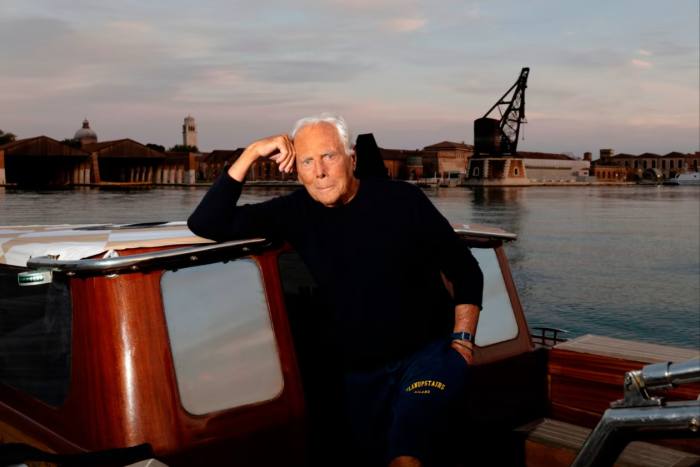[ad_1]
Receive free World updates
We’ll send you a myFT Daily Digest email rounding up the latest World news every morning.
This article is an on-site version of our FirstFT newsletter. Sign up to our Asia, Europe/Africa or Americas edition to get it sent straight to your inbox every weekday morning
Good morning.
The euro is on course for an eighth straight week of losses against the dollar, as investors respond to a widening gulf between a faltering economy in the eurozone and more robust growth in the US.
The currency has lost more than 5 per cent since mid-July to trade at $1.07. The steady grind lower reflects intensifying doubts over whether the European Central Bank will raise interest rates again at its meeting next week amid widespread signs that the eurozone economy is heading for a downturn.
Industrial production in Germany — the eurozone’s traditional growth engine — fell for a third month in a row in July, figures showed yesterday. Meanwhile, US jobless claims fell unexpectedly, the latest sign of resilience in the labour market. That is likely to encourage the US Federal Reserve to hold rates at a high level for longer, boosting the appeal of the dollar. Here’s more from analysts on the growing transatlantic discrepancy.
Here’s what else I’m keeping tabs on today and over the weekend:
-
Economic data: Germany publishes its consumer price index for last month today.
-
UK: Today marks the first anniversary of the death of Queen Elizabeth II.
-
G20 summit: Global leaders gather in New Delhi tomorrow. US president Joe Biden will push for a bigger World Bank to combat China’s rising influence, while his UK counterpart Rishi Sunak will urge India’s Narendra Modi to “call out” Russia over its war in Ukraine.
How well did you keep up with the news this week? Take our quiz.
Five more top stories
1. Exclusive: The Treasury is set to increase the UK state pension by more than 8 per cent next year because of the “triple lock”, which has raised retirees’ incomes faster than workers’ wages. Since 2010, the triple lock has ensured the state pension rises each year in line with inflation, average earnings or by 2.5 per cent, whichever is higher. Read the full story.
2. Investors knocked $200bn off Apple’s market value over fears of a crackdown on government iPhones in China, casting a shadow over the launch of its latest smartphone next week. Before the reported curbs, analysts had forecast the iPhone 15 could help make Apple the biggest smartphone maker by volume for the first time. Here are the other problems facing the tech giant.
3. Exclusive: Goldman Sachs is preparing to let go of staff deemed to be underperforming in another round of cuts that could come as early as next month. The bank has already axed thousands of jobs this year in an effort to save costs after a slowdown in investment banking activity and losses at its consumer banking business. Here are the people likely to lose their jobs.
4. Germany is pushing the EU to postpone tariffs on electric vehicle sales with the UK, backing calls by Rishi Sunak’s government for a three-year delay to the duties. The bloc is set to impose 10 per cent levies on EVs shipped across the Channel from January if they have batteries made outside Europe. Here’s why Berlin has shifted its stance.
-
Go deeper: After months of fruitless lobbying to deter Chinese EV imports, Europe’s carmakers are preparing to face down competition from their newest rivals.
5. Former FTX executive Ryan Salame has pleaded guilty to criminal charges related to the collapse of the cryptocurrency exchange. He is the fourth former FTX executive to cut a deal with prosecutors, further isolating founder Sam Bankman-Fried less than a month before his trial is set to begin. Here’s our report on the court hearing.
Person in the news

In 2017, Novo Nordisk’s chief Lars Fruergaard Jørgensen made the call to embark on an expensive trial for the weight-loss drug Wegovy. His gamble paid off. Positive initial data from the trial published last month sent the Danish pharma group’s shares soaring, eventually overtaking French luxury conglomerate LVMH on Monday. Here’s more on the man who dethroned Europe’s most valuable company.
We’re also reading . . .
-
Rugby World Cup: France is gearing up to host millions of fans for the event, a key test of security and readiness ahead of the Olympic Games next summer.
-
War in Ukraine: Talks between Russia and Ukraine are a moral hazard not just in Kyiv but for vulnerable states globally, writes Andreas Umland of the Swedish Institute of International Affairs.
-
Gender gap: The centrality of children to the earnings gap between men and women remains mind-boggling, writes Soumaya Keynes.
-
Business school: Student-led mentoring programmes are among that initiatives at France’s elite institutions aimed at boosting social diversity.
Chart of the day
Brent crude this week breached $90 a barrel for the first time this year after Saudi Arabia and Russia extended supply cuts, threatening to become another headache for US president Joe Biden as he puts his record on the economy — and thwarting inflation — at the centre of his re-election bid.

Take a break from the news
Giorgio Armani isn’t going anywhere. While Valentino, Gucci and Versace have all been sold to foreign investors, he remains the sole shareholder of the business that bears his name. “Everyone tells me I should just retire and enjoy the fruits of what I’ve built, but I say no . . . absolutely not,” the 89-year-old designer and chief executive told the Financial Times.

Additional contributions from Benjamin Wilhelm and Gordon Smith
[ad_2]
Source link
